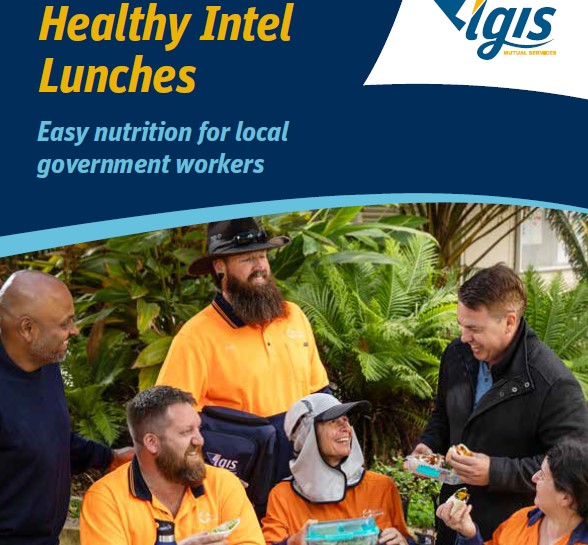
LGIS has recently launched its lunch box kit (including the newly released lunch recipe book - Healthy Intel Lunches) to support members when implementing their prevention and wellbeing programs.
This new resource will be a great tool for local governments to use and help drive more engagement in their initiatives.
Local governments can use this resource in a variety of ways, including as a prize or incentive for engaging in any wellbeing initiatives, such as health expos, health education workshop/cooking demonstrations, or services aimed at improving staff lifestyle behaviours.
The kit includes the recipe book, an insulated lunch bag and an insulated drink bottle; and aims at helping members bring in behavioural change in their workforce in terms of healthy eating habits and better nutrition.
At LGIS, we care about the health and wellbeing of local government workers across Western Australia. As the sector's mutual indemnity scheme, we know first-hand the issues that local government workers face and have developed a range of resources to support their wellbeing.
The LGIS program aims to provide a proactive approach to improve awareness and lower risk factors in the area of health and wellbeing and assist members in creating healthy workplaces. This in turn can help improve workers' safety performance, general health and wellbeing, as well as reduce workers compensation claims.
Commonwealth Scientific and Industrial Research Organisation (CSIRO) has recently released a health research – 'Healthy Diet Score report', which talks about the dietary habits of Aussie adults. The research is based on the results of 235,000 participants over an eight-year period between 2015 and 2023. It states that Australian adults scored an average of 55 out of 100.
It is interesting to note that the average discretionary food consumption by Aussies was about 28 serves per week. Alcohol, cakes and biscuits, chocolate and confectionary, and takeaway foods were among the top contributors to this discretionary intake.
“Although Australians are often perceived as fit and healthy, the low collective score shows that we just meet the pass mark when it comes to adopting the national dietary recommendations. The score is a stark reminder of the work that needs to be done to improve our eating habits and reduce the national waistline," said Dr Gilly Hendrie, CSIRO research scientist and co-author of the report.
To eat well, your diet should have a balance of good quality lean proteins, an abundance of fruit and vegetables in a variety of colours, fibre rich wholegrains or grain alternatives and healthy sources of fat.
Research has established that including all macronutrients (protein, carbohydrates, and fat) in the appropriate amount and frequency may have a positive impact on our health, energy, longevity and most importantly our ability to prevent disease.
For the recipe book, we have sourced our recipes from our monthly Healthy Intel newsletters, which also includes tips and tricks to improve overall health.
James Larkin, WorkCare Services Manager at LGIS is of the view that healthy eating is an essential component when trying to improve or maintain good health and wellbeing, but lunches can be difficult to get right. Whether we are low on time, motivation or healthy food options, sometimes lunch can be the forgotten meal in our day and convenience often takes over, particularly when we get busy during the day. LGIS has been providing members with monthly recipes in our Healthy Intel newsletter for over eight years, and we have now created a new resource which helps local government staff to make healthier food choices and improve eating habits.
For more information on these kits and LGIS' other health and wellbeing resources, please contact our WorkCare Services Manager, James Larkin on 0419 355 943 or email health@lgiswa.com.au